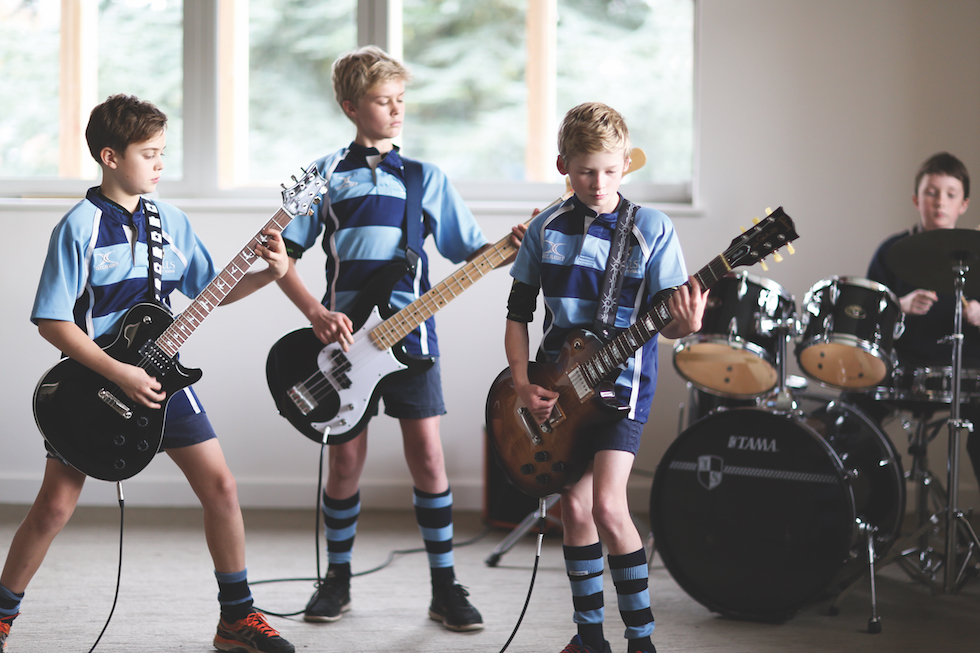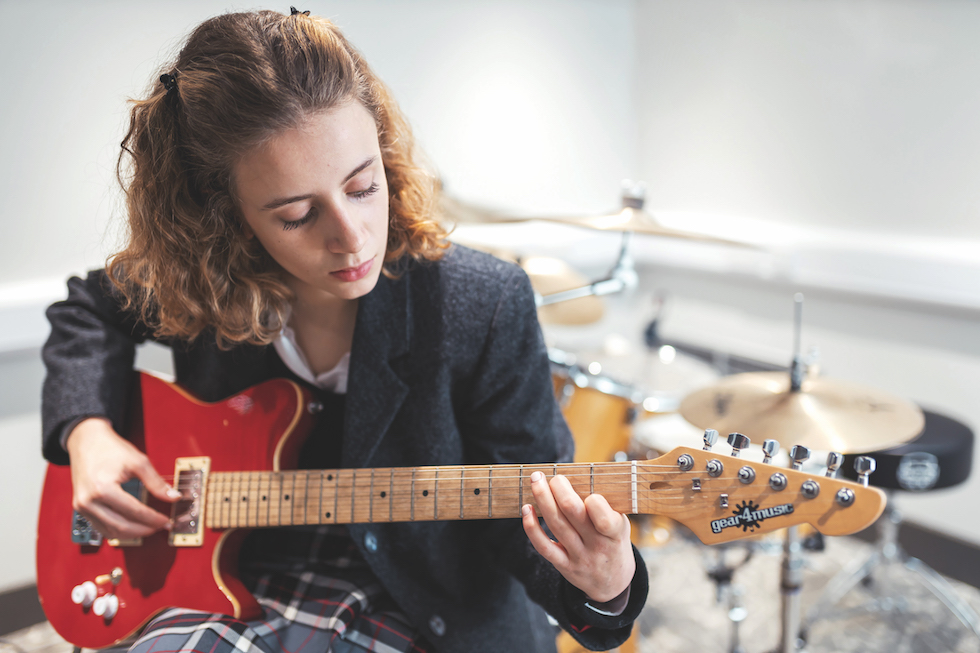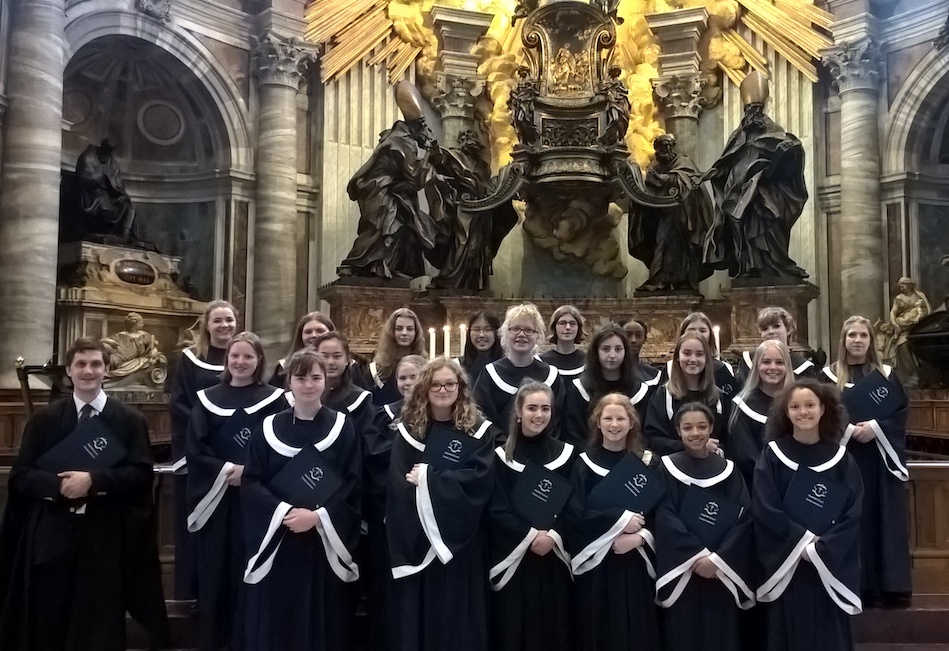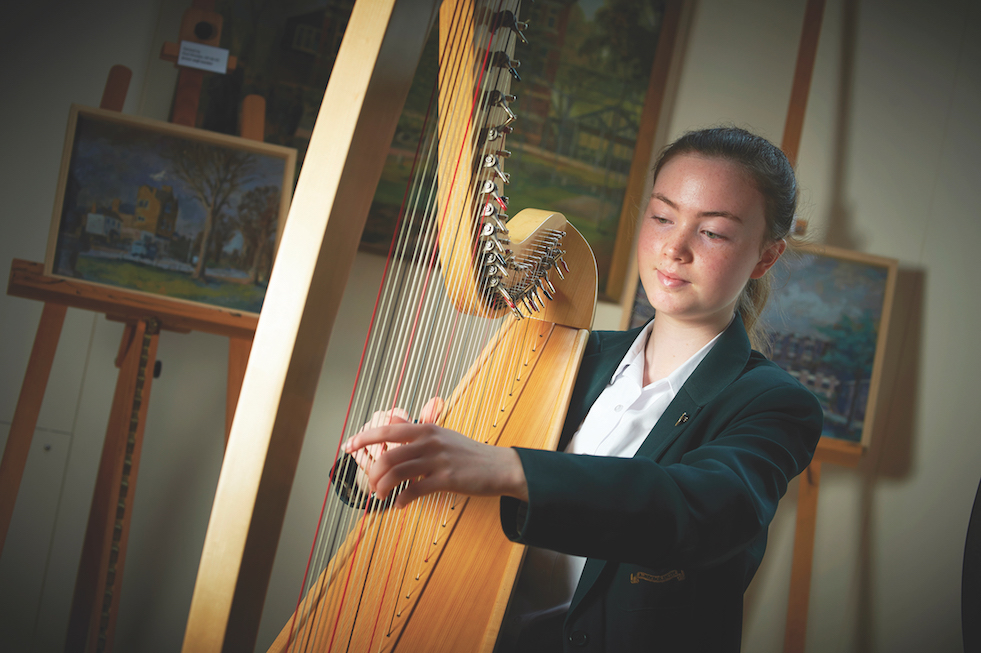
- HOME
- EDUCATION
MUSIC TO MY EARS
By | 4 years ago
Former chorister, Eleanor Doughty, extols the goody box of musical options available at independent schools

I have a few niche skills. I can recite the Lord’s Prayer in Czech, I know all the Christmas carol descants, and I know how to address a bishop. These are some of the things I learned by being a musician at school – and, for five years, being a cathedral chorister. In 2004, Lincoln Cathedral Choir visited Prague, and sang in St Vitus Cathedral, where we performed Janácˇek’s Lord’s Prayer. I can still recite this short prayer on demand, my least useful talent.
Being a musician at school meant more to me than missing lunchtime for orchestra. I performed jazz in the Royal Albert Hall and the Natural History Museum, and as a chorister, sang in front of an audience six days a week in the most beautiful cathedral in the land. These experiences were priceless.
Schools spend astronomical amounts competing with one another to give their pupils memories such as these. In January a £2.5m music school with double-height rehearsal space opened at Wrekin College, Shropshire, while at Benenden School in Kent, a music school and recital hall is part of a new £19m project.
Some music departments come with different kinds of bells and whistles. Richard Murray is headmaster of Christ Church Cathedral School, Oxford, home to 23 cathedral chorister boarders, 125 day boys and is a member of the Choir Schools’ Association. ‘We go to the cathedral every week and that has a profound effect on the boys,’ he says. ‘It’s like planting a time bomb in their brains which goes off when they realise what an effect being in such a place has.’ Most of his charges are musical to some degree – ‘if there’s musicality in anybody it will be found out,’ he says.
But Christ Church is not the kind of ‘music school’ where one might send a protégée, such as Chetham’s School of Music in Manchester. Christ Church is a school that has music in its veins. A small school, with pianos in every room, ‘rehearsals happen in corridors and on staircases. The place reverberates with music, and I think everybody is affected by that,’ says Murray.
The city of Oxford, with its college chapels, is a natural place to be musical. ‘It’s a very normal way of behaving here,’ says Murray. Choristers, he says, are one-of-a-kind. ‘They’re eloquent and they tend to use time efficiently. There is a civilised thoughtfulness about them.’ Being a chorister has a ‘growing up’ effect on a child. ‘They are pocket adults, more confident than their peers, and socially sophisticated.’ All this from a child of eight.

The fact of being a cathedral chorister gives one a unique set of reference points. Few not directly involved with the church have attended a bishop’s installation, as I did in 2002. But what happens after the cassock is hung up?
Technology has enhanced the way that music is taught, says Mark Wilderspin, director of music at St Paul’s School, London. ‘When I started teaching in the 1990s, you’d have to prepare your lessons with a tape or CD of whatever might come up. Now, something can come out of a conversation and you can play it in seconds because my iPad is hooked up to the WiFi.’ It also means, says Wilderspin, that young people are ‘fluent with technology from a production point of view – with programmes such as Garage Band’. This doesn’t mean that every Pauline is destined for the recording studio. ‘A lot of boys who would consider themselves card-carrying musicians, listen to a lot of classical, but that doesn’t mean they won’t plug into Ed Sheeran, or the Hamilton soundtrack.’
St Paul’s has plenty to offer the musician – orchestras, choirs, big band, swing band, as well as a ‘big sax group’. ‘If Paulines think that something is worth doing well, then that’s cool,’ says Wilderspin. ‘Though the average Pauline is inherently uncool – they are all quite geeky.’ This translates well into the music A-level.
‘It’s the only A-level that demands such a diverse skill base,’ says Dr Charlotte Exon, director of music at Downe House School in Berkshire. ‘There’s essay writing, analysis, the aural side, performance and composition. It is really academic.’ Time was when music might have been seen as a ‘soft’ option, she says, ‘but if you’re looking for prospective university candidates and they’ve got grade eight, you know they’ve put a lot of time in.’
The subject of music also contains a range of coveted ‘soft skills’. ‘Musicians learn to prioritise,’ says James Henderson, director of music at Sherborne School in Dorset. ‘It’s not dissimilar to sport in a sense that you’re part of a team if you play in an ensemble, and you’re letting others down if you don’t practice.’
Wilderspin agrees: ‘You are able to present yourself with a bit of confidence. Musicians tend to be bright people, but it gives them an edge if they are able to demonstrate that they can keep a few plates spinning.’

You are also exposed to a wider range of people, says Matthew Ward, director of music at Mayfield School in Sussex. ‘In the choir we have everyone from year seven to year 13. If they go on tour together, the year sevens learn that the year 13s are not so scary. It can be stratifying being in a year group, but music levels the playing field.’ It is confidence-building too. ‘Those girls seem to mature more quickly,’ Ward adds. ‘It’s an emotional intelligence thing. Is it the more gregarious girl that does music, or does the music make her more gregarious?’
Music has the admirable benefit of being something children can readily practise at home, given their chosen instrument is portable, or resources can be made available. While the provision of Zoom lessons is variable nationwide, with different schools taking different approaches to learning from home, some independent companies have stepped in to offer additional resources for musical children. M:Tech Education, which, in usual times, provides music composition courses for schools, has launched Team Tutti, a series of weekly music lessons that can be accessed from home. These, which include interactive quizzes and animated characters to keep things fun, get progressively more difficult, with the Team Tutti team on hand to answer questions from pupils. Their content has been rolled out in a variety of schools, including Richmond’s Falcons Preparatory School. ‘The breadth and variety of content is very stimulating and engaging for pupils,’ says Damian Peckham, director of music at Falcons. ‘The level of technical support and assistance means that every boy emerges with new skills and is able to develop existing talents.’
Music doesn’t always appeal as an academic subject, of course. For some pupils, it is purely a co-curricular activity. Increasingly, however, this is taken to the next level. In 2016 the Associated Board of the Royal Schools of Music (ABRSM) introduced a new performance-only Diploma, the ‘ARSM’ (Associate of the Royal Schools of Music), to be taken after grade eight, and before the DipABRSM. Dr Exon has six girls preparing for the ARSM: ‘it’s becoming almost standard that the girls are doing it, which is fantastic because they leave school with letters after their name.’
Some musical pupils will sit the diploma instead of taking music A-level as an option, explains Mark Forkgen, director of music at Tonbridge School in Kent, where around five boys take up music for A-level each year. Chris Eastwood, director of music at St Benedict’s School, Ealing, sees a similar trend. ‘There are sixth-formers who don’t feel strongly enough about it as an academic subject to carry on, but we still
see them heavily involved with co-curricular music within school.’
These co-curricular activities – orchestras, bands, and choirs – might remind some of the lunchtime clash between music and sport at school. At Sherborne, music has a ‘protected hour’ three days a week, explains Henderson. ‘The only other thing that can happen in that hour is a one-to-one academic consultation, otherwise school is just chilling, and musicians are doing their music. They are not missing anything to do it, and it enables them not to have to choose.’

Tonbridge has a system of ‘priority times’, explains Forkgen. ‘Thursday afternoon is sports priority time, before arts priority at four thirty until six pm.’ This is where boarding schools excel. ‘At day schools those choices have to be made. Here, with the long days and being on-site all the time, you have space for both,’ says Forkgen. Henderson agrees, citing the late-night rehearsal slots available to Shirburnians from eight forty-five to nine forty-five pm, popular with ‘our thriving rock society’.
What pupils have the chance to study changes as the curriculum evolves. The AQA music GCSE offers a solo or ensemble DJ performance option as part of its examination, alongside the study of western classical music from 1650-1910, while the Edexcel equivalent’s set works include tracks from Star Wars alongside Bach’s Brandenberg Concerto.
At Tonbridge, boys take the IGCSE, which contains world music. ‘Culturally it’s brilliant as we have a lot of boys from Hong Kong,’ says Forkgen. Classical music might not be ‘cool’ to everyone, adds Eastwood, but that’s the beauty of the subject. ‘The moment you start trying to make it “cool”, you lose sight of what it is you’re trying to do. You can start playing Harry Potter themes in orchestra, but the best musicians- want to play the symphonies. That, for them, is cooler.’
This article was originally published in the Autumn/Winter 2020 issue of School House Magazine
READ MORE | Military Schools



